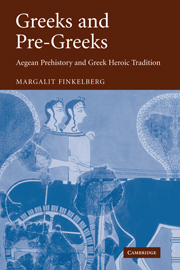Book contents
- Frontmatter
- Contents
- List of maps
- List of figures
- Preface
- List of abbreviations
- Chapter 1 Introduction
- Chapter 2 The heterogeneity of Greek genealogy
- Chapter 3 The pre-Hellenic substratum reconsidered
- Chapter 4 Kingship in Bronze Age Greece and Western Asia
- Chapter 5 Marriage and identity
- Chapter 6 The spread of the Greek language
- Chapter 7 The end of the Bronze Age
- Chapter 8 Continuities and discontinuities
- Appendix: The Testament of Hattusili
- List of references
- Index of passages cited
- General index
Preface
Published online by Cambridge University Press: 22 September 2009
- Frontmatter
- Contents
- List of maps
- List of figures
- Preface
- List of abbreviations
- Chapter 1 Introduction
- Chapter 2 The heterogeneity of Greek genealogy
- Chapter 3 The pre-Hellenic substratum reconsidered
- Chapter 4 Kingship in Bronze Age Greece and Western Asia
- Chapter 5 Marriage and identity
- Chapter 6 The spread of the Greek language
- Chapter 7 The end of the Bronze Age
- Chapter 8 Continuities and discontinuities
- Appendix: The Testament of Hattusili
- List of references
- Index of passages cited
- General index
Summary
It is almost impossible for a Homerist not to become involved, at one stage or another, in the world that the Iliad and the Odyssey purport to describe. My own interest in Aegean prehistory was first aroused by reading Denys Page's History and the Homeric Iliad many years ago. Gradually, the unqualified acceptance of Page's interpretation and conclusions as regards the relationship between the Homeric tradition and the Aegean Bronze Age gave way to systematic questioning of the assumptions from which he proceeded, which eventually led to conclusions diametrically opposed to those arrived at by Page. This, however, does not diminish the impact that his singularly stimulating book had on my work.
This book was long in the making. A number of the arguments found in it have appeared in various publication venues since 1988, but it was not until 1998 that they combined to form a larger thesis. The active participation in discussions which took place on AegeaNet, a discussion group on the prehistoric Aegean moderated by John Younger, during this very year was undoubtedly one of the factors that stimulated me to consolidate the ideas from which this book developed, and it was in 1998 again, at the Seventh International Aegean Conference held in Liège, that its main thesis was first presented. I am also much indebted to the Institute for Advanced Studies, Jerusalem, where I spent six months in 1999 as a member of the international research group on Mechanisms of Canon-Making in Ancient Societies.
Information
- Type
- Chapter
- Information
- Greeks and Pre-GreeksAegean Prehistory and Greek Heroic Tradition, pp. xi - xiiiPublisher: Cambridge University PressPrint publication year: 2006
